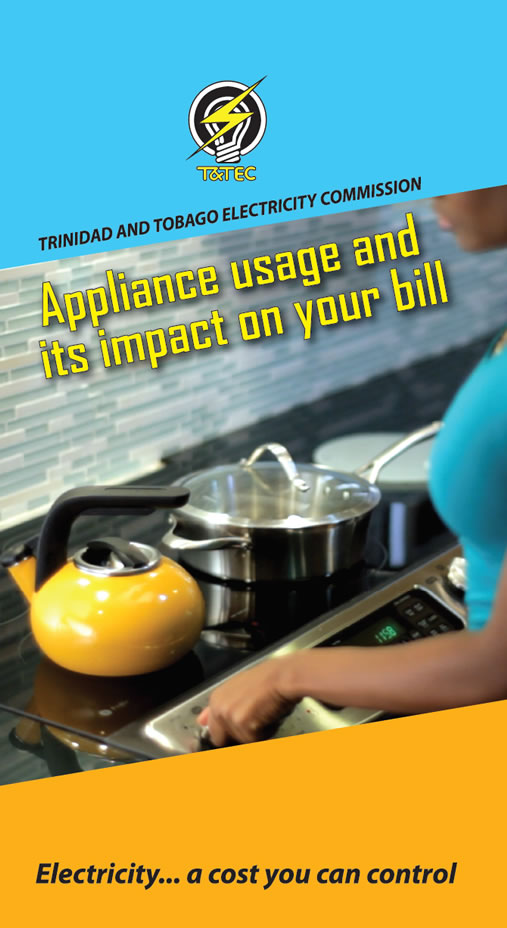
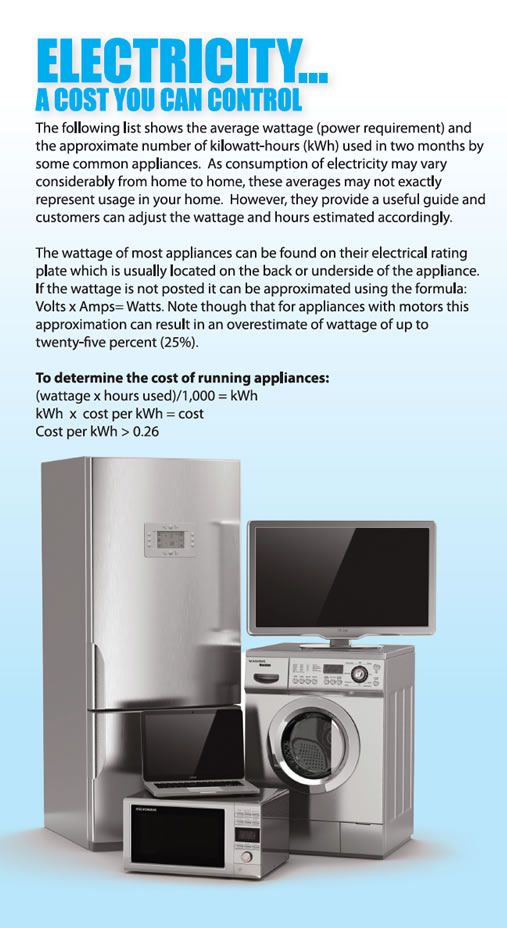
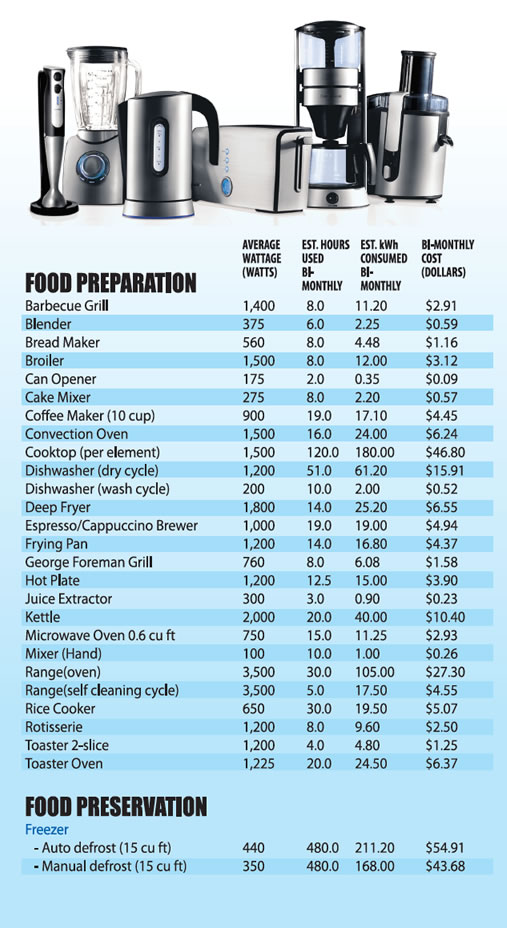
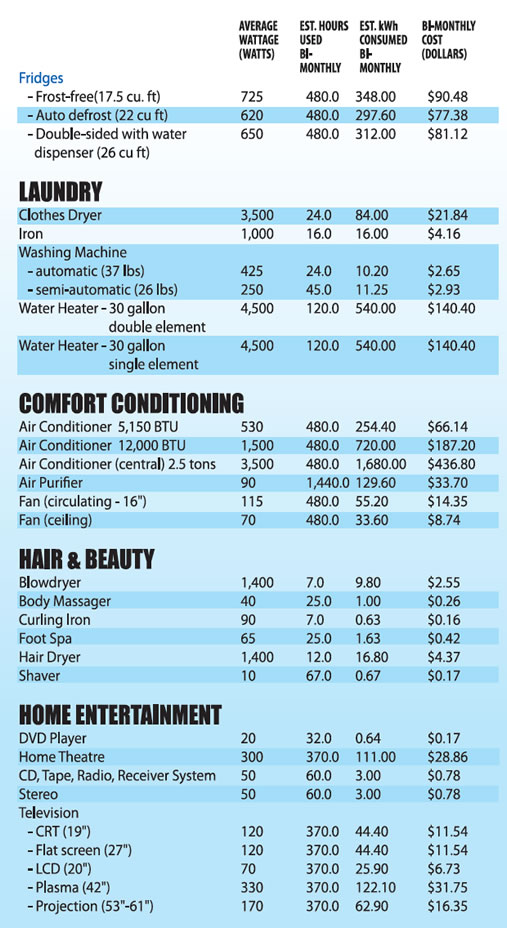
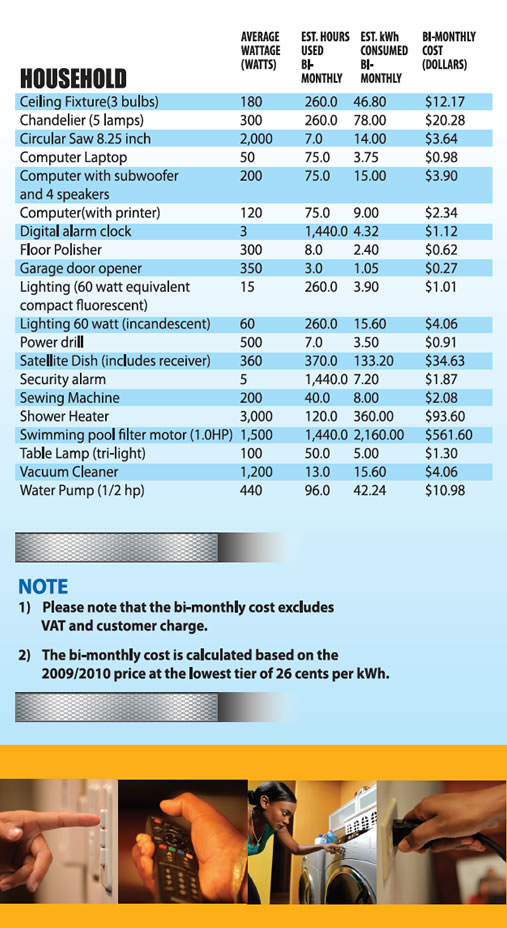
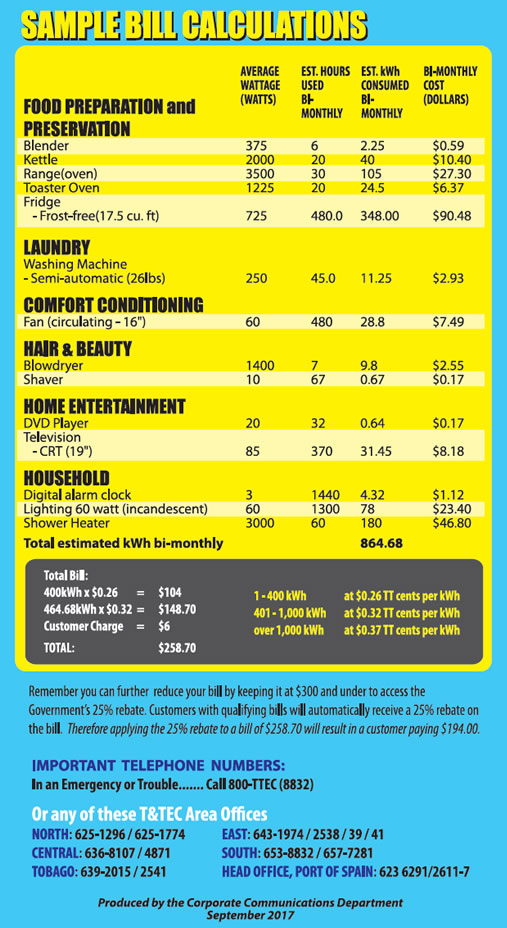
… AND REDUCE YOUR ELECTRICITY BILL
This is conservation in its most meaningful sense, acknowledging the responsibility which we all share, to use our natural resources intelligently and prudently, avoiding waste and preserving our depletable assets. The wise and judicious use of electrical energy benefits both you and the country in two direct and distinct ways:
- It guarantees for the generations to come, a longer period over which our natural energy resources may be extended for our use and convenience.
- It provides you the customer with an ideal opportunity to reduce the cost of energy to you.
For these reasons T&TEC, your Electricity Utility, has taken time to provide you with this collection of invaluable tips which could help you to continue to enjoy the pleasures and joys of electricity at A COST WHICH YOU CAN CONTROL. Energy saved is energy earned.
AIR CONDITIONERS
You can enjoy the comfort of your air conditioning unit and pay less if:
- The room is properly sealed i.e. doors and windows fit properly and wherever there is glass it is shaded or draped.
- Drapes, shades and awnings shield windows from the hot sun, keeping your home cooler. Certain reflective films can be used on windows to screen out the hot rays of the sun without reducing the amount of light you receive. And, when doors and windows are shut, your air conditioner will operate more efficiently.
- The unit at time of purchase is sized correctly for the area to be cooled and the intended number of persons occupying the room. The wrong size air conditioner will use more electricity and increase your energy bills.
- The thermostat is set in the comfort zone i.e. between 22°C – 25°C.
- Do not block the air vent with furniture.
- Where you install your air conditioner has a lot to do with how efficient it will be. If you have a choice, locate your units on the best-shaded side of your home. If the unit is exposed to direct sunlight, it has to work much harder and use more energy to cool your home. If you do not have a shaded area you should build some form of artificial shading.
- Keep shrubbery away from your air conditioner since it blocks vents and reduces the unit’s ability to exhaust air. Allow adequate free space on the outside to exhaust hot air.
- On very hot days, the temperature in your attic can reach 150 degrees. Improving the ventilation in your attic will lower the temperature of the entire house and make your air conditioner’s job a lot easier.
- Regular maintenance will ensure that your air conditioner operates efficiently throughout the year. Check the filter once a month by holding it up to a bright light. If you cannot see through it, it’s time to clean or replace the filter. You can also check your owner’s guide to find out how to safely clean the condenser coils and fans on the outside of the unit.
- On very hot days, you can also save energy by closing the fresh air intake on your unit. Cooling fresh, warm outside air required more electricity than re-cooling the air that is already circulating in your home.
- You can save on cooling costs by avoiding cooling rooms that are not occupied. If you like your home to be cool when you come home at the end of the day, automatic timers for air conditioners are available that will turn the unit on before you arrive rather than have it run all day.
- In cool conditions fans provide low cost comfort. Fans can make your air conditioner’s job easier while saving you money. Pedestal and ceiling fans improve the air circulation in your home, allowing you to raise the air conditioner’s thermostat. In moderate heat, fans can sometimes completely replace air conditioners. Ceiling fans use only about one-tenth the electricity of a typical home air conditioner and therefore cost only one-tenth as much to operate.
- To stay comfortable during the hottest hours of the day, do your cooking, laundry and bathing in the early morning or late evenings. These activities all increase the level of humidity in you home making it less comfortable and forcing the air conditioner to work even harder. If other heat generating appliances, such as irons, ovens and blow dryers are used only in the early morning or late evening, your home will stay cooler.
CLOTHES DRYER
- Remember a clothes dryer is just a heating element, use only where air drying is not possible.
- In using a clothes dryer one full load will use less energy than several small loads.
- Avoid overloading.
- If you have more than one load of clothes to dry, try to do each load immediately following the previous one. This uses the heat of the previous cycle and increases the efficiency of the dryer.
- If you are in the market for a new clothes dryer, consider purchasing one with a “moisture sensing” device that shuts off automatically when your clothes are dry, so the dryer does not run longer than necessary.
- If you do not have a moisture sensing device, you can reduce drying time and energy use by setting your timer carefully. Over-drying your clothes also shortens the life of the fabric and could cause shrinkage and static cling.
- Separating heavy and light fabrics will also keep drying time at a minimum. Mixing different weight fabrics causes the dryer to run longer than necessary.
- If drying the family wash takes more than one load, leave small lightweight items until last. You may be able to dry them after you turn the power off with the heat, retained by earlier loads.
- Remember to check the lint filter before each load. Lint build-up blocks air flow and lengthens drying time, costing you energy dollars.
- Remove items when dryer stops to avoid unnecessary wrinkling which may require pressing to remove.
DISHWASHERS
- Your dishwasher works best with a full load. Since 80% of the energy used in automatic dishwashers goes toward heating water, you can save by running the dishwater only when it is full. Running a half-filled dishwasher twice uses two times as much energy as running a full load once.
- Several small loads will use much more energy. You can also save by taking advantage of the energy saving control on many dishwashers that turns off the heat during the drying cycle. Opening the dishwasher after the rinse cycle and letting the dishes air dry is another way to save energy.
- Washing dishes by hand may not save energy or money. In fact, you can probably save energy using the dishwasher since hand-washing usually requires hot water.
- When shopping for a new dishwasher, look for models that require less hot water. Dishwashers differ in the number of gallons of hot water used in wash cycle. The manufacturer’s specifications or the Energy Guide label should list this information.
- Many new dishwashers have an internal water heater that raises the temperature of the incoming water to 60 degrees Centigrade. This device allows you to turn down the temperature on the hot water heater in your home and still have your dishes washed thoroughly.
- Use only dishwasher detergent. Other cleaning agents can block the washing action, causing overflow and possible damage to the appliance.
- Remove excess food before placing dishes in the dishwasher.
- Check the filter frequently to be sure it’s not clogged with food.
ELECTRIC COOKERS/OVEN
- In using your cooker, the pots, etc. should sit flat and fit the element to avoid heat loss. Using a small pan on a large burner wastes energy. Cookware with flat bottoms and tight covers is your best choice.
- When boiling water, etc. fill only enough in the container as needed. Never boil water in an open pan. Water will come to a boil faster and use less energy in a kettle or covered pan.
- Avoid allowing food to spill on elements and drip pans. I f this happens, clean as soon as the element is cool.
- Preheating the oven is not always necessary.
- Although often recommended, it is not really necessary to preheat the oven for foods with a cooking time of over one hour. Also, using glass pans allows you to set the oven 25 degrees lower since glass retains heat.
- Keep elements and oven clean. Where only small portions of food are to be cooked, toaster ovens, microwave ovens and electric frying pans are more efficient.
- If you do use a conventional oven, try to avoid “peeking” by opening the oven door. Each “peek” can lower the oven temperature by as much as 25°C. Instead, cook by time and temperature. When roasting, use a meat thermometer to prevent over or under cooking and excess shrinkage. Use a timer to time all precise cooking operations. Timing prevents loss of heat through repeated openings of the oven door or by “peeking under the lid” during surface cooking.
- When preparing a meal in your oven, try to use foods that are cooked at about the same temperature. That way your oven can cook several dishes at the same time and you would not waste valuable energy dollars.
- Start baking with products needing the lowest temperature.
- When cooking with electricity, get in the habit of turning off burners several minutes before the allotted cooking time. The heating element will stay hot long enough to finish the cooking without using more electricity.
- Use high heat setting to bring water to a boil or to start cooking foods with water; then reduce the heat to desired lower setting. But don’t set an electric surface unit on “high” if you’re just warming an item.
IRONING
- Remove clothes that will need ironing from the dryer while they are still damp. There’s no point in wasting energy to dry them thoroughly if they only have to be dampened again.
- First iron those fabrics that require lower temperatures and work up to those requiring higher heat. An iron heats faster than it cools.
- Turn off iron five minutes or so before all clothes have been ironed and finish ironing with the heat stored in the soleplate.
- Always turn off the iron when work is interrupted by telephone or doorbell.
- Do all your weekly ironing at one time
LIGHTING
- Lighting accounts for about 15% of a home’s electric use. Therefore turn off all lights that are not needed. Use lamps which will give an adequate amount of light without eye strain. Dimmers are sold in stores and can be installed to control the amount of light.
- Fluorescent lamps provide far more light than incandescent ones, these should be used where possible. They give out more lumens per watt. For example, a 4-watt fluorescent lamp would save about 140 watts of electricity over a seven-hour period. These savings, over a period of time, could more than pay for the fixtures you would need to use fluorescent lighting.
- Consider fluorescent lighting for the kitchen sink and countertops areas.
- High efficiency fluorescent lamps are initially more costly but last longer and use much less energy. This is particularly good for office lighting.
- Photoelectric cells and timers should always be used for security lighting.
- Lighting controls or “timers” can help save energy dollars, too. Timers can be set to turn lights on or off at predetermined times while photocell controls are sensitive to light and turn lamps on and off at sundown and sunrise. Dimmers can vary the level of illumination according to how much light you may want in a given situation.
- A lot of energy can be saved by matching as closely as possible light bulb wattage to lighting needs. A high wattage lamp in a hallway or alcove as an example, is not energy efficient.
- You can save by turning off incandescent lights when you leave the room. If you use fluorescent lighting, however, turn them off only if you will be gone longer than 15 minutes because fluorescent lights use as much energy in starting as they use during 15 minutes of operation, so it’s not worthwhile to turn them off for brief periods.
- Consider using task lighting (lighting directed at a specific area) instead of overhead or general lighting, which may light unused areas of the room and could cast darkening shadows in the work area. By limiting lighting only to areas where it is needed, savings in the cost of bulbs and energy can be made.
- By keeping lights and fixtures clean, lighting efficiency can be improved. As much as 20 % of the light generated can be lost to hazing dusts. Also take advantage of reflected light by keeping portable fixtures as close as possible to light-coloured walls or other surfaces. These easy steps may reduce the number and wattage of bulbs you need and help you save on your energy bills.
- Need new lamps? Consider the advantages of those with three-way switches. They make it easy to keep lighting levels low when intense light is not necessary. Use the brightest setting only for reading or activities that require more intense light.
- Always turn three-way bulbs down to the lowest lighting level when watching television. You will reduce the glare and use less energy.
MICROWAVE
- Your microwave oven must be located to allow proper ventilation. Your microwave oven is much more efficient than your conventional (stove) oven.
- A microwave oven is an energy efficient alternative to a conventional oven. It cooks food more quickly and it uses 70-80% less electricity than regular ovens. It is usually advisable to leave whatever you are cooking or heating in the microwave oven for at least 15-20 seconds longer following the end of the predetermined time. In this way, you get full advantage of the heat that was built up.
- However, it is much less efficient than the stove top elements for cooking, boiling water, etc. and in defrosting food.
- Microwave ovens have a high current rating and must be used on an independent circuit.
- Microwave ovens must be tested regularly for leakage.
NEW APPLIANCES
Most of these tips focus on how you can get the most from the appliances you own now. But you may be considering replacing an appliance in you home.
When you are shopping for a new appliance, check for the Energy Guide label that tells you the unit’s Energy Efficiency Rating or EER. The higher the EER, the more efficient the air conditioner and the more money you will save. T&TEC recommends an EER of 10 or higher.
Keep appliances in good working condition so they will last longer, work more efficiently, and use less energy.
Don’t leave your appliances operating when they’re not in use.
Rechargeable appliances generally use more energy than those that operate directly from the electrical outlet.
Although very efficient appliances may cost more to buy, they pay for themselves through lower energy bills.
RADIO/TV
- Your radio and television sets provide you and your family with vital information and home entertainment. It will cost you a lot less if you turn off your sets when no one is listening or viewing. Switch on only for programmes which you and other family members are interested in.
- Read, exercise, or play games instead of watching TV.
REFRIGERATORS & FREEZERS
Like other appliances that heat and cool, refrigerators are big energy users. In order to ensure that your refrigerator door is shut tightly, the door seal must be cleaned and checked regularly for proper sealing.
You can get the best out of your appliances if you observe these simple guidelines:
- Ensure that it is located to allow a free flow of air all around and away from direct sunlight or any other heat sources. Maintain adequate clearance, as recommended by the manufacturer, from walls and/or cabinets.
- It is best to keep the refrigerator away from heating appliances (ovens and dishwashers), windows and heating ducts, since direct exposure to heat forces the unit to work harder and use more energy.
- Ensure that the cooling compartment is kept between 5°C and 10°C and the freezing compartment between -2°C and -5°C. In the case of freezers, the temperature should be kept at -5°C and the compartment full for safe and efficient operation.
- Ensure that the condenser coils are cleaned twice per year. Cleaning the condenser coils found in the back or bottom of the refrigerator will maximize its efficiency. a brush or vacuum can be used. If dust or dirt is allowed to accumulate, operation will be impaired. Be sure to unplug the refrigerator before you start cleaning.
- Ensure that frost is not allowed to build up in the freezing compartment (approximately 6mm). Defrost freezer when the frost has accumulated on a manual-defrost model. The frost build-up causes the cooling system to operate longer and use more energy.
- Although automatic defrost refrigerators are convenient, their defrosting features use a lot of electricity. A manual defrost refrigerator typically uses about two-thirds of the energy used by a frost free refrigerator.
- Ensure that the seals around the door/doors are fitting properly. A door leak allows cool air to escape, forcing your refrigerator to use more energy to keep food cold. Test them by closing the door over a piece of paper or a dollar bill so it is half in and half out of the refrigerator. If you can pull the paper or bill out easily, the latch may need adjustment or the seal may need replacing.
- Limit the opening of refrigerator door to a minimum. In that way you will save energy and money.
- A freezer’s efficiency is increased by keeping its compartment full.
- Cool very hot foods for a short time at room temperature before placing in the refrigerator. But don’t let food stand for too long – bacterial growth can make it unsafe.
- Label all food clearly and legibly. This eliminates confusion and facilitates quick removal of food.
- Place more frequently-used food items in the front of the refrigerator or freezer.
- Store products loosely to allow good air circulation.
- Proper wrapping of foods helps prevent excess frost formation on sides and coils.
- Make a mental list of the things you need before you open the refrigerator or freezer door; then, take out as many items as you can at one time.
WASHING MACHINE
- Always try to use a full and balanced load. Running the washer with only full and balanced loads will save energy and water.
- Since 90% of the energy your washer uses goes towards heating water, you can save by using hot water only for heavily soiled laundry or where otherwise specified.
- Where hot water is necessary for washing, you can rinse in cold. Since the temperature of the water used during the rinse cycle will not make the clothes any cleaner, you can save by using cold water rinses for each load.
- Don’t use too much detergent. Oversudsing makes your machine work harder and use more energy.
- Pre-soak or use a soak cycle when washing heavily soiled garments. You will avoid two washings and save energy
WATER HEATERS
- The hot water heater is the second largest energy consumer in the home. Using it efficiently can add up to big savings.
- All exposed hot water pipes should be insulated.
- If the water heater is in a very cool area, it should be covered or insulated to avoid loss of heat.
- The thermostat on water heaters is normally set at 60°C. You will find a setting of 50°C much more efficient.
- Where hot water is not required on a continuous basis either turn the water heater off or have a timer wired into the circuit.
- Where hot water pipes run through walls and underground ensure there are no leaks. Leaky faucets can make a dent in your hot water bill, so repair them as soon as possible. The constant drip wastes water, energy and money. Running the clothes washer with a full load and using cold water whenever possible can lead to big energy savings.
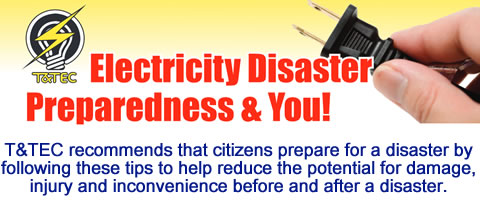
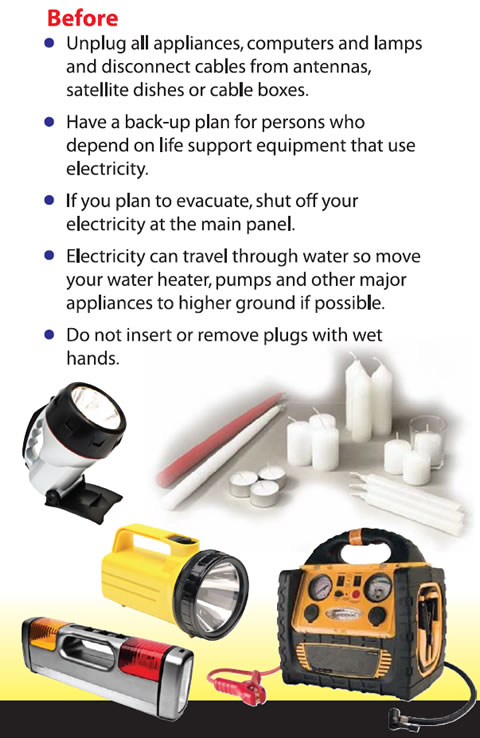
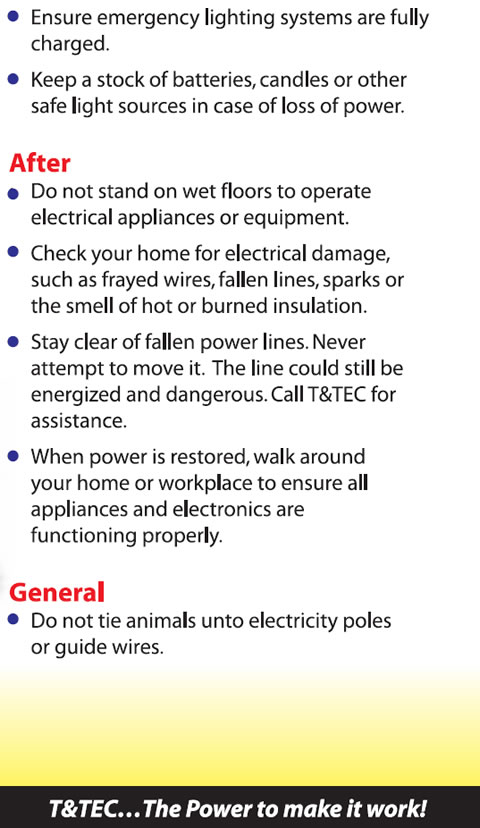
Electricity Safety Tips
Electricity can keep your home comfortable, light the path to your door and cook your food. Or used unwisely, it can cause a shock… or even start a fire. The power is yours. Make electricity your friend.
… and I have some brilliant tips on how to use me and my family.
Electricity can be a powerful friend…or a dangerous enemy. A lot depends on your awareness of the rules that apply to its safe use. To help ensure that you and your loved ones enjoy the benefits of electricity without the threat to loss of life in the home or out-of-doors, do what I do”…
GENERAL
- Respect the power of electricity
- Read and follow the operating instructions that come with every electrical product
- Replace worn or frayed electrical cords
- Relocate appliance cords so they won’t be walked on, and children can’t pull on them
- Check wire, extension cords regularly to ensure that they are not damaged (with no wires exposed) Discard and replace worn out cords immediately
- Read manufacturer instructions before installation or use of electrical devices
- Wiring should be reinspected every five years by the Government Electrical Inspectorate
- Remember to employ a qualified, licensed personnel to supervise and/or carry out any electrical installation
- Know your emergency numbers and keep them handy
IN THE HOME
- Be sure your house is wired to carry the voltage of all your electrical household appliances
- Enquire as to how many appliances can be in use simultaneously and follow the recommended guidelines
- Avoid putting too many plugs into one outlet
- Always disconnect appliances not in use, or being repaired
- Look around your house and eliminate overloaded outlets
- Make sure all your appliances are operating within the stipulated electrical guidelines
- In the event of malfunctioning of appliances or any sign of electrical fire, turn off the main circuit immediately… and give us a call
- Never touch appliances or wires with wet hands or feet
- Never use wet appliances
- Unplug all electrical appliances before attempting to repair them
- Never use radios, hair dryers or any electrical appliances in the shower or near a bath tub or pool
- Always disconnect an appliance by pulling the plug, not by tugging the cord
- Never run extension cords under rugs or furniture
- Turn off direct power supply before replacing burnt-out bulbs
- Always match bulbs with correct voltage
- Switch off all appliances not in use when leaving home
- Train children not to put things into electrical outlets. Plastic outlet guards are a good idea
- Check wires, extension cords and appliances regularly for signs of wear
- Use power tools with three-pronged plugs
HOME WIRING
- Always call a qualified electrician to do any wiring in your home.
- Application for supply should be made well in advance of the date the supply is required. This can be made at any of the Commission’s Service Centers.
- It is advisable that customers consult with T&TEC to determine the best location of the point of supply for a new installation or a modified installation.
- Before the Commission connects an installation to its system, it must be presented with an inspection certificate of approval (Obtained from the Electrical Inspectorate Division, Ministry of Public Utilities).
CORDS AND PLUGS
- When disconnecting an appliance, pull the plug, not the cord.
- Keep all cords away from heat and water.
- If multiple electrical connections are required.
- Do not break off or bypass the third prong of a plug. Its there because it’s needed for safety reasons.
- Never use cords or plugs that show any wear or damage.
- Do not place a cord under a carpet, through a doorway or anywhere that it could be stepped on.
- Never remove a plug when your hands are wet or when touching a metal object.
EXTENSION CORDS
- Keep you extension cords away from water.
- Do not use a two pronged extension cord outdoors.
- Always use extension cords that are properly rated for the load.
- Never break off or bypass the grounding prong on a three-pronged plug.
- Worn cords can cause shocks and fires. Do not use them!
- When removing a plug from a socket, pull on the plug and not on the cord.
APPLIANCES
- Unplug the toaster before prying out toast that is wedged in.
- Never use electrical tools or appliances near water.
- When buying appliances look for the yellow energy guide labels.
POWER TOOLS
- Always unplug power tools when they are not in use or when changing an attachment on them.
- Do not stand on a damp floor or wet grass when operating power tools.
FUSES
- If a fuse blows, turn of all appliances and lights on the circuit before changing the fuse.
- Replace the blown fuse with one of the correct rating – never with a higher one.
- Periodically check that plug type fuses are snug. A loose fuse can overheat.
OUT OF DOORS
- Keep ladders, kites and TV antennas away from power lines
- Don’t play or stand near electrical structures such as utility poles, substations, metres, transformers or guy wires
- Never prune or cut down a tree near a power line.
- Teach children to stay clear of all electrical installations
- Obey all safety signs and warnings
- Use only electrical equipment designed for outside use
- Use ground fault circuit interrupters on all plugs located outdoors.
- If you see a fallen power line, call the electric company. Warn others away
- If you have an underground electrical service, before digging identify overhead and underground power lines.
- Call before you dig? You could hit a buried cable, conduit or gas pipeline and run the risk of loss of life or damage to property.
- Never build a swimming pool or other structure under the power line leading to your house. Before digging, learn the location of underground power lines
- Keep your radio and appliances away from swimming pools or wet surfaces.
ELECTRICAL FIRE SAFETY TIPS
- know your emergency numbers and paste them to the telephone
- If you smell smoke or see flame, unplug appliances involved or turn off power at the main control panel
- CALL THE FIRE DEPARTMENT. Be sure to give your name and address and tell them it’s and electrical fire
- If the fire is very small, put it out with a fire extinguisher or baking soda. NEVER USE WATER
- If the fire is too big, get everyone out of the house fast. Don’t panic
- Rehearse your response in advance. Fire drills save lives
IF SOMEONE IS SHOCKED…
- Don’t touch anyone in contact with a power source. Unplug appliance or turn off power
- If you can’t turn off power, separate the victim from power source with a dry pole, dry rope or dry clothing Don’t do this outdoors if the victim is touching a high-voltage ire. Dial your emergency number
- If the victim is not breathing, apply mouth-to-mouth breathing or cardiopulmonary resuscitation (CPR). Then cover with a blanket, keep head low, and get medical attention
- Administering CPR requires training. Ask your local hospital or Red Cross where to get instructions
REMEMBER THESE ELECTRICAL RULES
- Fuses or circuit breakers “blow” when there’s an overload, short or faulty appliance. Fix the trouble before restoring power
- Electricity will go to ground through any good conductor: metal, liquid or YOU. Stay out of its path. Never touch appliances or wires with wet hands or feet
“Use electricity wisely and cautiously… it’s the bright thing to do”





